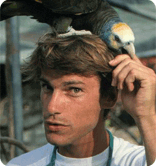Conservation: Trade in African Grey Parts

My Question: I spoke with a gentleman from Africa at the Loro Parque Convention in Sept. I related to some bird people his story that African Grey body parts, not just the live birds themselves, are collected and sold in Africa. He said sometimes grenades are thrown into flocks to kill them for ease of collecting parts. One of the bird people, a frequent naysayer said he thought these were just made up stories and not true. Would be nice if I am wrong, but I wonder…. Could WPT shed some light on this issue? Are the birds being killed for their body parts? If true are there some on-line reports that I could distribute to these unbelievers?
Thank you.
Janice Boyd

Dear Janice, This is a good question and one we’ve puzzled over for the last few years. You may recall that we ran a short piece on this in the PsittaScene with some grisly pictures of grey parrot heads and tails which were apparently being traded for sale. Clearly there has been at least one incident of this type in Cameroon, and at the time, the suggestion was that the parts were being sold in Nigeria.
Since that time, we have asked all our contacts in that part of the world if they know of substantial trade of any parrot parts. From what we’ve heard back, it sounds like this might have been a fairly isolated incident, possibly the result of a trader making the best of a group of birds which died off unexpectedly. This sort of thing happens from time to time, including a tragic incident involving the deaths of over 700 greys in South Africa recently (traded live birds that didn’t survive the flight). Although this was not the case in South Africa, my guess would be that traders who find themselves with a bunch of dead birds might well try to find a market for their feathers or other parts. In the end, just about anything is possible, so it’s probably hasty to rule anything out, however, we haven’t encountered any solid evidence that such a trade exists on a scale even remotely like that of the trade in live birds. I’ve heard the grenade rumor too, but haven’t heard of any direct observations of such barbarism, nor indicators that is at all widespread.
Of concern here is how people perceive the value of working to stop the wild bird trade. For many years, we’ve faced a lot of opposition from governments and even ‘conservation’ ngo’s who feel that either the wild bird trade is a positive activity which provides jobs for local people, or that it can’t be stopped, or some combination of both. Typically when a ban or a moratorium comes into play, there are large groups of birds in the pipeline which are suddenly caught in an awkward situation - they’ve already been harvested despite the policy change, but the traffickers can’t get export permits. In general, we work pretty hard to release these birds back to the wild, and ideally to reintroduce the species in question into areas where they are locally extinct, but many people who favor the trade see these incidents as “proof” that the trade can’t be stopped and shouldn’t be stopped. Naturally, if birds are being eaten for food or being killed and sold for their parts, these same voices are likely to latch on to such observations as justification for their pro-trade positions. There is a fairly detailed discussion of some of these issues on this thread in our forums if you’d like to delve in more deeply.
In the end, we feel that major bans on trade like the ones in Australia, USA, and EU have had dramatic and lasting consequences, nearly eliminating the international legal trade in wild birds. Recent figures from the WCMC suggest that the EU ban alone has eliminated over 90% of the legal trade - many millions of birds each year, as illustrated in the chart below.

There is still a lot of work to do in places like Africa and South America, but we’re making strides now country-by-country, including Cameroon where thousands of greys have been confiscated from traffickers and released in recent years (more info about that here)
All best wishes,
Jamie

































